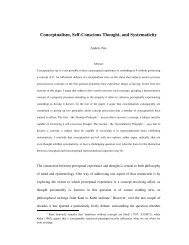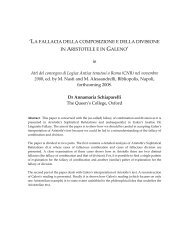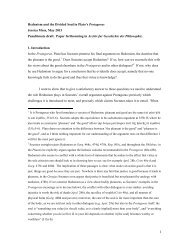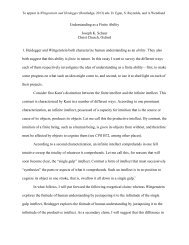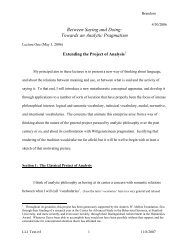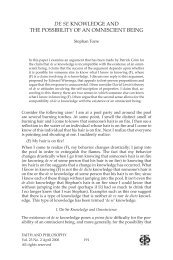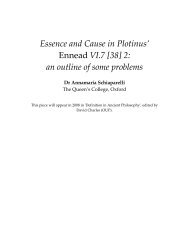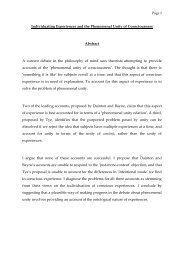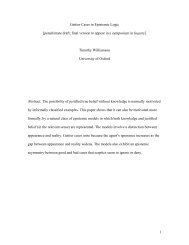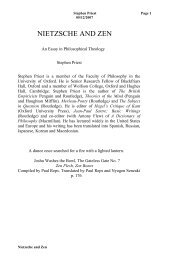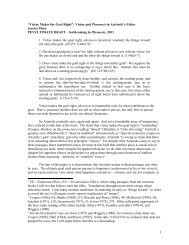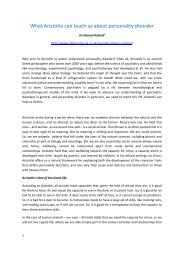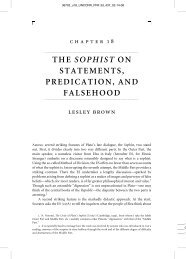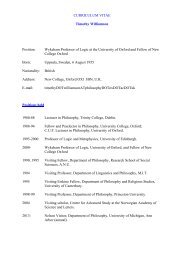The Geography of Genethics and the Ends of Life1 - University of ...
The Geography of Genethics and the Ends of Life1 - University of ...
The Geography of Genethics and the Ends of Life1 - University of ...
You also want an ePaper? Increase the reach of your titles
YUMPU automatically turns print PDFs into web optimized ePapers that Google loves.
Heyd’s second argument for an asymmetry between genethics <strong>and</strong> mortethics invokes a<br />
desire-based account <strong>of</strong> <strong>the</strong> badness <strong>of</strong> death. “[Categorical] desires make us not only<br />
wish to go on living (not to commit suicide), but also to be happy that we did not die two<br />
years ago. But <strong>the</strong>y cannot make us happy to have been born at all, since had we not been<br />
born <strong>the</strong>re would not have been any such categorical desires” (1992: 123). I am not<br />
convinced that one can account for <strong>the</strong> harm <strong>of</strong> death by appeal to desire, but let me<br />
waive that concern here, for Heyd’s argument fails even if we accept a desire-based<br />
account <strong>of</strong> death’s badness. If frustrated desire is able to explain death’s badness <strong>the</strong>n it<br />
can also explain <strong>the</strong> badness <strong>of</strong> having come into existence. It is true that I wouldn’t have<br />
had any categorical desires had I not been born, but it is also true that I wouldn’t have had<br />
any categorical desires now had I died two years ago. Heyd seems to confuse <strong>the</strong> claim<br />
that an actual person might wish to not have been born with <strong>the</strong> claim that a non-actual<br />
person might have had wishes. 3 <strong>The</strong> latter claim is incoherent, but <strong>the</strong> former claim is not.<br />
If it is coherent to prefer a future X over future Y on account <strong>of</strong> <strong>the</strong> fact that fewer <strong>of</strong> one’s<br />
categorical desires are left unsatisfied in X than in Y, <strong>the</strong>n it is coherent to regret that <strong>the</strong><br />
actual world is one in which one has many unsatisfied categorical desires (<strong>and</strong> few<br />
satisfied ones), ra<strong>the</strong>r than a world in which one doesn’t (<strong>and</strong> didn’t) exist <strong>and</strong> thus has no<br />
unsatisfied categorical desires (or, <strong>of</strong> course, satisfied ones).<br />
Bernard Williams once remarked that “while [a man] can think egoistically <strong>of</strong> what it<br />
would be for him to live longer or less long, he cannot think egoistically <strong>of</strong> what it would<br />
be for him never to have existed at all” (Williams 1973: 87). Can one think egoistically <strong>of</strong><br />
what it would be for <strong>the</strong> world to carry on without one? I think so. One can certainly wish<br />
to avoid a future <strong>of</strong> unrelieved suffering, <strong>and</strong> in this sense one can have an egoistic<br />
preference for a future that lacks oneself over a future that includes one. And if that is so, I<br />
don’t see why one can’t wish—on egoistic grounds—that one had never come into<br />
existence.<br />
I have not attempted to tackle no-faults genethicism head-on. Instead, I have argued that<br />
no-faults genethicists are committed to an Epicurean view <strong>of</strong> death. Epicureans, no doubt,<br />
will be nonplussed by this approach, but true Epicureans are few on <strong>the</strong> ground. Coupled<br />
with its intrinsic counter-intuitiveness, it seems to me that this result gives us good reason<br />
to look elsewhere for an acceptable genethical model. At <strong>the</strong> very least, this result<br />
provides us with a useful constraint on genethical <strong>the</strong>ory building.<br />
3 Holtug 2001 also makes this point.<br />
8



